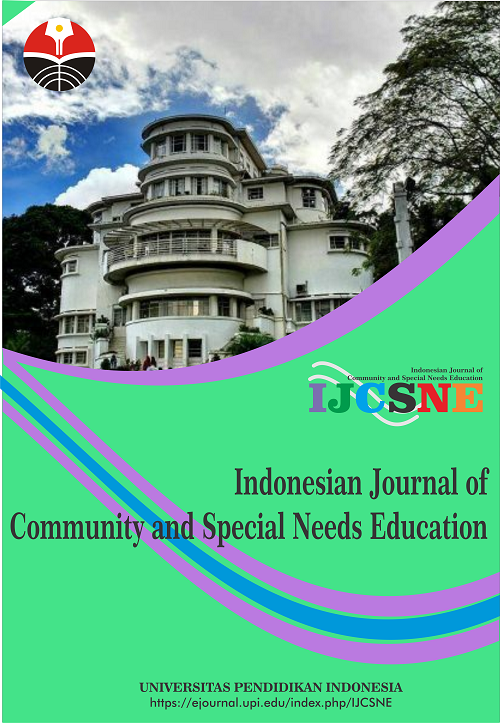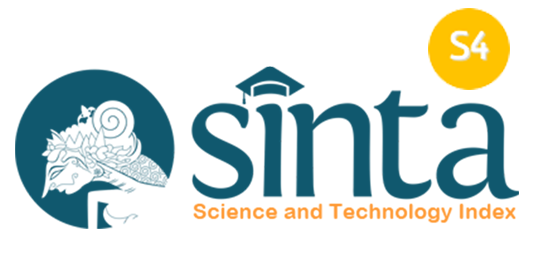Attitude of Hearing Impaired Students Towards Assistive Technology Utilization in Oyo State Adopting the Survey Method
Abstract
Keywords
Full Text:
PDFReferences
Abedalaziz, N., Jamaluddin, S. and Leng, C. H. (2013). Measuring attitudes toward computer and internet usage among postgraduate students in Malaysia. The Turkish Online Journal of Educational Technology, 12(2), 201-216.
Adekunle, S. E. (2017). Attitude of acdemic staff towards the use of information and communication technolgy as pedagogical tool for effective teaching in FCT College of Education, Zuba-Abuja, Nigeria. International Journal of Education and Pedagogical Science, 11(11), 2393-2398
Amesi, A., and Yellowe, I. T. (2018). Availability and utilization of information and communication technology gadgets in faculties of education in rivers state universities, Nigeria. International Journal of Education and Evaluation, 4(4), 26-36.
Amosa, A. A., and Obielodan, M. O. (2019). Enhancing active-learning through interactive-video for teaching pottery in selected upper-basic schools, Nigeria. Indonesian Journal of Education and Research, 4(1), 1-5.
Anyira, I. E. (2013). Gender implication in awareness and use of search engines by private universities lecturers in South-South Nigeria. Library Philosophy and Practice, 102(9), 1-14.
Ariga, H. O. (2021). Technology-enhanced learning platform among undergraduates in private universities in Nigeria during COVID-19 era. European Journal of Educational Technology, 4(1), 1-13.
Bakare, A.O., (2013). Socio-demographic variables as predictors of psychological well-being amongst the adolescents with hearing impairment in Southwest Nigeria. IFE PsychologIA: An International Journal, 21(1), 245-259.
Chapelle, C. A. (2010). The spread of comuputer-assisted language learning. Language Teaching, 43(1), 66-74.
Ebrahimi, S. S., and Jiar, Y. K. (2018). The use of technology at malaysian public high schools. Merit Research Journal of Education and Review, 6(3), 54-60.
Edmunds, R., Thorpe, M., and Conole, G. (2012). Students attitude towards and use of ICT in course study, work and social activity: A technology acceptance model approach. Bristish Journal of Educational Technology, 43(1), 71-84.
Hanapiah, M. F. (2017). English Language and the language of development: A Malaysia Perspective. Jurnal Kemanusiaan, 2(1), 34-45.
Islam, N. (2017). Faculty members’ attitude towards the use and application of Library and Internet resources: A case study on Rajshahi University, Bangladesh. Sociall Science Journal, 21(2), 117-134
Kunda, D., Chember, C. and Mukupa, G. (2018). Factors that influence Zambian higher education lecturers’ attitude towards integrating ICTs in teaching and research. Journal of Technology and Science Education, 8(4), 32-40.
Lavanya, J. and Santharooban, S. (2018). Usage of online resources by the undergraduates attached to the faculty of agriculture, Eastern University, Sri Lanka. Journal of the University Librarians Association of Sri Lanka, 21(2), 89-105.
Mahmood, F, Halim, H.A, Rajindra, S, and Ghani, M.M. (2014). Factors affecting teacher’s utilization of technology in Malaysian ESL classrooms. The Malaysian Online Journal of Educational Technology. 2(2), 15-23.
Oladimeji, O. F., Adeyanju, L. O., and Fakorede, S. O. (2017). Colleges of education lecturers attitude towards the use of information and communication technology in Nigeria. Malaysian Online Journal of Educational Science, 5(4), 1-12.
Ologe, M. (2014). Factors effecting the usage of ICT by the teaching members at Jerash University. Canadian Social Science, 10(6), 222-226
Onojah, A. O., Abimbola, I. O., Obielodan, O. O., Olumorin, C. O., Aderogba, A. J. and Adeyanju, C. (2019). Undergraduate Student’s Readiness Toward the Adoption of Study Technology for Learning in Kwara State, Nigeria. Indonesian Journal of Education and Research, 4(2), 2019, 68-73.
Radabaugh, K. R., Malkin, E. M., Hollander, D. J., and Peebles, E. B. (2014). Evidence for light-environment control of carbon isotope fractionation by benthic microalgal communities. Marine Ecology Progress Series, 495, 77-90.
Sabzian, F., and Gilakjani, A.P. (2013). Teachers’ attitudes about computer technology training, professional development, integration, experience, anxiety, and literacy in English language teaching and learning. International Journal of Applied Science and Technology, 3(1), 67-75.
Sanchal, A. and Sharma, S. (2017). Students attitudes towards learning mathematics: Impact of teaching in a sporting context. Teachers and Curriculum, 17(1), 89-99.
Soetan, A. K., Onojah, A. O., Alaka, T. B., and Aderogba, A. J. (2020). Hearing impaired students’ self-efficacy on the utilization of assistive technology in federal college of education (special) Oyo. International Journal for Cross-Disciplinary Subjects in Education, 11(1), 4245-4252.
Uloaku, I. P. (2017). Utilization of internet resources/services by academic staff of national water resources institute and federal college of forestry mechanization, Kaduna, Kaduna State. Advances in Sciences and Humanities, 3(5), 54-60.
Usang, A. I., Archibong, D. O., Aji, E. E., Eyong, C., Ukam, E., and Bassey, O. A. (2018). Assessment of influence of student perception, knowledge and area of specialization on ITC utilization for academic purposes in colleges of health technology, Calabar. International Journal of Medicine and Medical Science, 10(3), 36-41.
Van Deursen, A. (2012). Internet skill-related problems in accessing online health information. International Journal of Medical Informatics, 81, 61-72.
Vekiri, U. (2010). The use of Internet in media education. The Turkish Journal of Educational Technology, 9(2), 245-255
Yu, K. C., Fan, S. C., and Lin, K. Y. (2015). Enhancing students’problem-solving skills through context-based learning. International Journal of Science and Mathematics Education, 13(6), 1377-1401.
Yusuf, M. O., Fakomogbon, M. A., and Issa, A. I. (2012). Effectiveness of computer’ supported cooperative learning strategies in learning Physics. International Journal of Social Sciences Education, 2(2), 94-109.
DOI: https://doi.org/10.17509/ijcsne.v1i2.36963
Refbacks
- There are currently no refbacks.
Copyright (c) 1970 Universitas Pendidikan Indonesia

This work is licensed under a Creative Commons Attribution-ShareAlike 4.0 International License.















